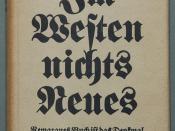From the dismantling of hopes and dreams to the desolation of bodies and battlefields, the idea of the destruction of way appears often in the novel, All Quiet on the Western Front by Erich Maria Remarque. Many soldiers died, affecting the lives of friends and family. The environment took a blow with constant artillery fire, shell-holes, and gas clouds. For the most part the whole population of the warring countries took a hit from the destructiveness of war.
Before progressing into the depiction of the destructiveness of war portrayed in the novel let us take a quick look at how we define this idea. The first thought to pop in one's head when hearing "destruction" would be bombs and death, and that is totally true. Yet there is another way to look at it. There is more to destruction than mass explosions and people dying; destruction also deals with the deterioration of the mind and spirit.
The war got into the characters minds and changed them forever. Never could they be the same again.
Thinking in terms of bombs and "booms" there is the destruction of the earth. "Our artillery fires on it constantly, but still it does not cease," (page 47) is a constant idea running through the entirety of the novel. Throughout All Quiet on the Western Front, behind the deaths and anguish, is the depiction of shells blasting giant shell-holes in the ground and shooting large holes right through the buildings of the unfortunate towns that lie in the path of war. "The earth booms. Heavy fire is falling on us," (page 47).
Going along with the idea of tangible objects taking a hit from the war is the thousands of deaths. Nothing is more obvious then death as a property of war. Constantly there...


